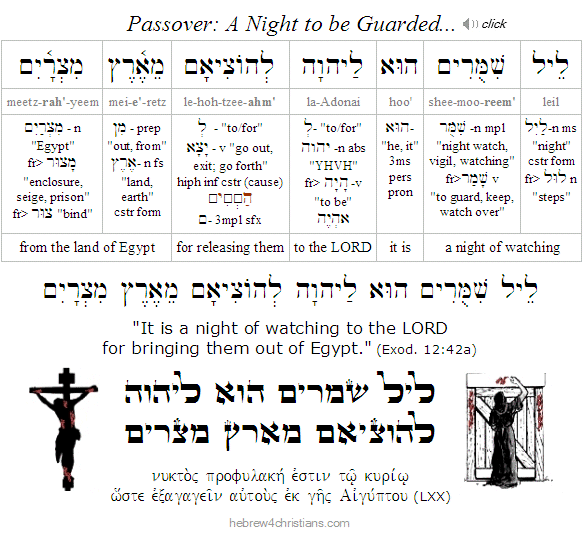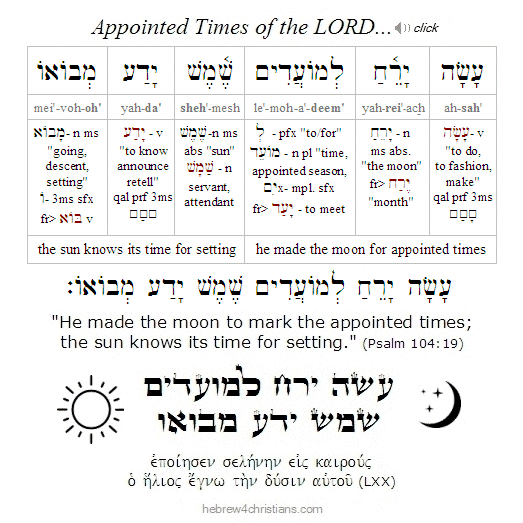|
It's been said that "the liturgy of the Jew is his calendar." We usually read parashat Bo near Rosh Chodesh Shevat, which reminds us again of the sacred calendar that is revealed in the Torah. In fact, the very first commandment given to the nation of Israel (as opposed to the patriarchs or to individual leaders such as Moses) was to sanctify the new month of redemption: "This month shall be the head of the months (i.e., Rosh Chodashim) for you. It shall be the first month of the year for you" (Exod. 12:2). This implies that our corporate identity as the redeemed people of God begins with a shared consciousness of time from God's perspective. All of the mo'edim (festivals of the LORD) are reckoned using the calendar that was revealed to the redeemed Israelite nation. As the psalmist later declared: "He made the moon for the appointed times" (Psalm 104:19). And since Yeshua came to perfectly fulfill the meaning of these appointed times, it is clear that he observed this calendar as well (Gal. 4:4-5).
עָשָׂה יָרֵחַ לְמוֹעֲדִים
שֶׁמֶשׁ יָדַע מְבוֹאוֹ
ah·sah · ya·rei'·ach · le·mo·a·deem
she'·mesh · ya·da' · me·vo·oh

"He made the moon to mark the appointed times;
the sun knows its time for setting" (Psalm 104:19)
Download Study Card

Hebrew Lesson:
Psalm 104:19 Hebrew reading (click):
Our Torah portion this week states that the Jewish people were in Egypt 430 years, b'etzem hayom (בְּעֶצֶם הַיּוֹם) - "to the selfsame day" (Exod. 12:40-41). According to tradition, Moses encountered the burning bush at Sinai on the 15th day of the month of Aviv (i.e., Nisan), and the Exodus from Egypt occurred exactly one year later, on Nisan 15. Passover therefore commemorates the "appointed time" when God would redeem His people:
 |
Leil Shimurim - A Night to be Guarded
"At the end of 430 years, on that very day (i.e., Nisan 15), all the hosts of the LORD went out from the land of Egypt" (Exod. 12:41). Immediately after stating this, the Torah refers to Passover as leil shimurim (לֵיל שִׁמֻּרִים), a "night to be guarded" (from the verb shamar, which means "to watch" or "to guard"). "It is a night that is guarded (leil shimurim) by the LORD to take them [Israel] out of Egypt; this night remains a night to be guarded (שִׁמֻּרִים) by the people of Israel throughout their generations" (Exod. 12:42). Since "this night" - ha-lailah hazeh (הַלַּיְלָה הַזֶּה) - was guarded by God from the beginning to be the time of redemption, Israel must therefore "guard this night" (i.e., keep a vigil) by means of the Passover Seder (Exod. 13:10; Deut. 16:1). The festival of Passover recalls and celebrates God's faithfulness and redemptive love...
Hebrew Lesson
Exodus 12:42a Hebrew reading (click):
 |
Note that the phrase leil shimurim literally means "night of the watches" (shimurim is plural), and therefore it refers not only to the original redemption in Egypt (i.e., the Passover), but also to the time of future redemption by the Messiah (Shemot Rabbah 18). This explains why this night is a vigil for all generations (Matt 24:42). The Talmud (Tractate Rosh Hashanah 11a) further states: "In Nisan our forefathers were redeemed from Egypt, and in Nisan we will be redeemed." In that sense, Nisan is called Chodesh ha-Yeshuah (חדֶשׁ הַיְשׁוּעָה), the "month of the salvation," both in terms of the physical deliverance from Egypt, but more profoundly in terms of the salvation given through the Messiah Yeshua (הַמָּשִׁיחַ יֵשׁוּעַ), who was crucified as the "Lamb of God" precisely during this time...
The LORD is a God of order, and the appointed times (מוֹעֲדִים) were intended to reveal prophetic truth about him. Apart from the visitation of the Messiah Yeshua, the Exodus is the most fundamental event of Jewish history. In addition to being commemorated every year during Passover (Exod. 12:24-27; Num. 9:2-3; Deut. 16:1), it is explicitly mentioned in the first of the Ten Commandments (Exod. 20:2), and it is recalled every Sabbath (Deut. 5:12-15). The festivals of Shavuot and Sukkot likewise derive from it (the former recalling the giving of the Torah at Sinai and the latter recalling God's care as the Exodus generation journeyed from Egypt to the Promised Land). Indeed, nearly every commandment of the Torah (including the laws of the Tabernacle and the sacrificial system) may be traced back to the story of the Exodus. Most importantly, the Exodus prefigures and exemplifies the perfected work of redemption given through the sacrificial life of Yeshua the Messiah, the true King of the Jews and the Lamb of God.
The very first occurrence of the word "Torah" in the Scriptures refers to the obedient faith of Abraham (Gen. 26:5), and the second occurrence refers to the law of Passover: "There shall be one law (תּוֹרָה) for the native and for the stranger who sojourns among you" (Exod. 12:49). There is a link between these two occurrences. Abraham lived before the time of the Exodus, of course, and therefore the he obeyed the law of Passover by means of the Akedah (the sacrifice of his "only begotten" son Isaac). Despite offering his son up upon the altar at Moriah, Abraham believed in the LORD and it was credited to him as tzedakah (righteousness). Abraham's obedience revealed that the inner meaning of Torah is that the "righteous shall live by faith" (Hab. 2:4, Rom. 1:17). The Torah of Passover likewise teaches that redemption from death is possible through the exchange of an innocent sacrificial victim. The blood of the Passover was "a sign" of imputed righteousness that was obtained entirely by faith. This is the "korban" principle of "life-for-life" that underlies the Torah of the sacrificial system of the Tabernacle as well. Ultimately all true Torah points to Yeshua, who is the divinely appointed Redeemer and the beginning and goal of all of creation... "When the fullness of time (τὸ πλήρωμα τοῦ χρόνου) had come, God sent forth his Son, born of woman, born under the Torah, to redeem those who were under the Torah, so that we might receive adoption as sons" (Gal. 4:4-5).
|






